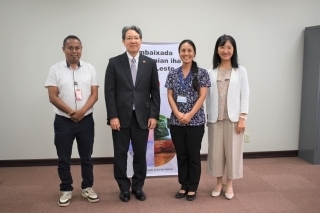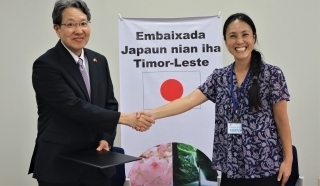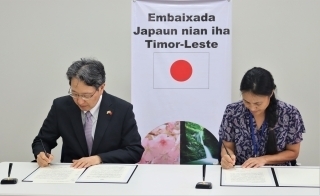The Government of Japan continues to support farmers and communities of Atsabe in partnership with CARE
2023/2/10
 Group photo
Group photo
 Ambassador Kimura and Ms. Yoko Ito, Project Manager of CARE International Japan
Ambassador Kimura and Ms. Yoko Ito, Project Manager of CARE International Japan
 Signing the grant agreement
Signing the grant agreement
Dili, 10th February, 2023 – The Government of Japan continues its support to farmers and communities of Atsabe, in partnership with CARE International Japan and CARE International in Timor-Leste. On 10th February, Tetsuya KIMURA, Ambassador of Japan and Yoko ITO, representative of CARE, signed a grant agreement for the third year of the “Hasa’e Fornesimentu Sistema Bee ba Agrikultura iha Atsabe (HAFORSA 2) Project”. Implemented in Atsabe in Ermera municipality, the project is funded by the Government of Japan through CARE International Japan.
The signing of the agreement marks the start of the third year of the project, which runs from February 2023 to February 2024 with a project value of US $310,269. The HAFORSA 2 (2020-2024) Project builds on the achievements of the HAFORSA 1 Project (2016 – 2019), particularly in increasing agricultural roductivity by establishing agricultural water facilities and ensuring effective capacity of the farmers groups to maintain the facilities.
In the second year of the project, CARE worked with 12 local farmers groups in four villages. Some of the groups sell vegetables to local schools for the school feeding programme, and others at their local markets. Five groups established agricultural water supply systems in 2021 and expanded their farmlands last year. Seven more groups built agricultural water supply systems last year. Additionally, the introduction of the drip-irrigation systems enables female farmers to improve the productivity of their vegetable plots.
The signing of the agreement marks the start of the third year of the project, which runs from February 2023 to February 2024 with a project value of US $310,269. The HAFORSA 2 (2020-2024) Project builds on the achievements of the HAFORSA 1 Project (2016 – 2019), particularly in increasing agricultural roductivity by establishing agricultural water facilities and ensuring effective capacity of the farmers groups to maintain the facilities.
In the second year of the project, CARE worked with 12 local farmers groups in four villages. Some of the groups sell vegetables to local schools for the school feeding programme, and others at their local markets. Five groups established agricultural water supply systems in 2021 and expanded their farmlands last year. Seven more groups built agricultural water supply systems last year. Additionally, the introduction of the drip-irrigation systems enables female farmers to improve the productivity of their vegetable plots.
In its third year, the project aims to increase the sustainability of the intervention, enabling farmers and their communities to be self-sufficient beyond the project operational period, particularly in maintaining horticulture production and the facilities built by the project.
While significantly increasing the agricultural production, the project also aims to address gender inequality between female and male farmers by challenging gender norms, promoting equitable workloads and decision-making power in the household and community. CARE provided training to enhance women’s leadership skills to increase their role in decision-making for agricultural processes.
Achievements from the project also reflects the strong commitment and contribution of Japan to enhancing nutrition in Timor-Leste, through the cultivation and promotion of nutritious vegetables in the household and local schools
While significantly increasing the agricultural production, the project also aims to address gender inequality between female and male farmers by challenging gender norms, promoting equitable workloads and decision-making power in the household and community. CARE provided training to enhance women’s leadership skills to increase their role in decision-making for agricultural processes.
Achievements from the project also reflects the strong commitment and contribution of Japan to enhancing nutrition in Timor-Leste, through the cultivation and promotion of nutritious vegetables in the household and local schools
